PNCR Executive Winston Murray passed away at 7:20 tonight at the Georgetown Public Hospital. He had been on a life support machine since November 11.
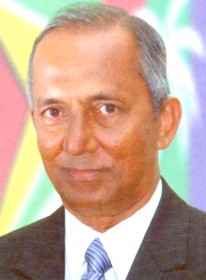
The announcement of his passing was made around 8.20 pm by his colleague Ronald Austin.
Friends and relatives began gathering and there were emotional scenes.
Leader of the opposition and PNCR Leader, Robert Corbin tonight referred to Murray’s death as “a sad loss for the party and the country”. He said Murray has given loyal and dedicated service both in and out of government.
Corbin said that the party has been preparing to give Murray his “full honours and due respect” for the contribution he has made over the years. His comment came around 9:50 pm, shortly after he had arrived at the hospital to extend his condolences to Murray’s family and reflect on his life with other party members gathered.
Corbin said too that discussions with government with respect to any plans for Murray would likely take place tomorrow.
In a statement tonight, President Bharrat Jagdeo said: “I wish on behalf of the Government of Guyana, and on my own personal behalf, to express our sadness on the passing of the Honourable Winston Murray, Member of Parliament and a former Deputy Prime Minister. Mr. Murray’s passing has robbed this country and especially the National Assembly of an articulate and intelligent debater whose presentations in the House were always of an exceptionally high standard. He was an outstanding Guyanese and fine human being, resolute and firm in his convictions.
“I am pleased to say that I have always enjoyed cordial relations with Mr. Murray. He was someone who did not hold grudges nor allowed differences to be an obstacle towards the cultivation of genuine human friendship. He was a dedicated Guyanese who has served his country with distinction and dignity.
“I know how difficult his passing is for his family, and especially how testing has been the period since his hospitalization. I wish to join in extending my heartfelt sympathies to his wife, children, other relatives, friends and supporters. Please be assured of my personal regards.
“I also extend my condolences to his party, the People’s National Congress Reform of which Mr. Murray was a long-standing member.”
The Guyana’s People’s Partnership headed by former PNCR executive Peter Ramsaroop said it was saddened at the “death of a colleague, a friend and foremost an individual that has served his country with commitment, dedication and honour.”
Ramsaroop said Murray was always there when he called on him for advice on economic matters and especially during the budget debates.
“We respect his statesmanlike demeanor and knowledge and we will continue to use his approach and support of an opposition coalition as we fight for a better Guyana for all its people”, Ramsaroop’s group said.
Collapsed
Murray, 69, collapsed two Thursdays ago on the East Bank while standing in a line. He was then rushed to the Balwant Singh Hospital and later transferred to the Georgetown Public Hospital.
It was later determined that he had suffered severe haemorraghing in the brain and remained unconscious. He was later hooked up to a respirator.
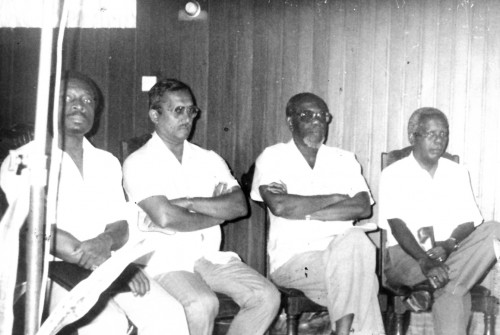
Guyanese neurosurgeon Dr Ivor Crandon was flown in from Jamaica last weekend on a flight chartered by the Guyana Government and he later ruled that there was no sign of brain activity and surgical intervention was not advisable.
Murray’s family and supporters then continued to mull what should be done and there was some talk of further tests being done.
Murray had been in the midst of a hectic campaign to be the presidential candidate for the PNCR at the next general elections. He had been on visits to various parts of the country.
His passing is seen as a severe blow to the PNCR and the opposition. He was deemed to be among the most articulate and effective debaters for the opposition in Parliament.
He leaves to mourn his wife Marva, sons Shaun and Mark and other relatives.
Last Parliamentary presentation
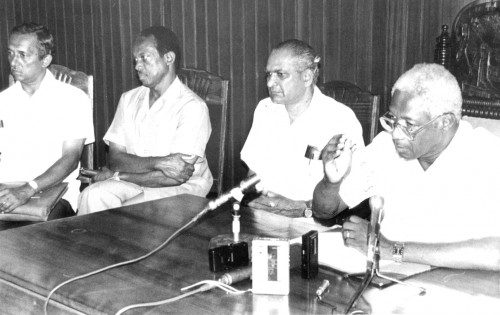
Hours before he collapsed, Murray, then PNCR Shadow Finance Minister, had made an impassioned presentation urging the government to come clean on an Amerindian fund which should have been set up to take in royalties from mining on Amerindian lands.
Murray had accepted PM Sam Hinds’ explanation of the origins of the fund but took him to task for not addressing the central issue of the whereabouts of the money.
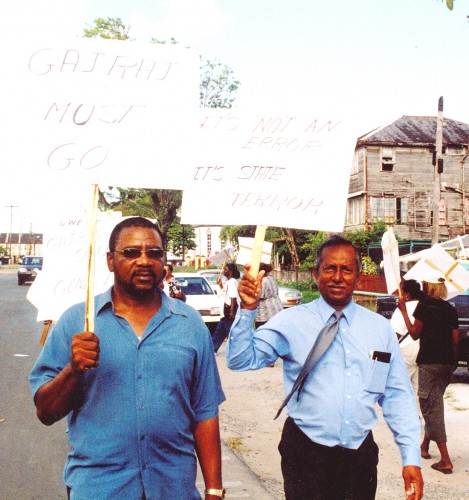
“Won’t it have been nice to tell us that the fund was created on such and such a day and the fund exists in this bank account under this ministry’s control and that the fund has x million dollars in it?” he queried.
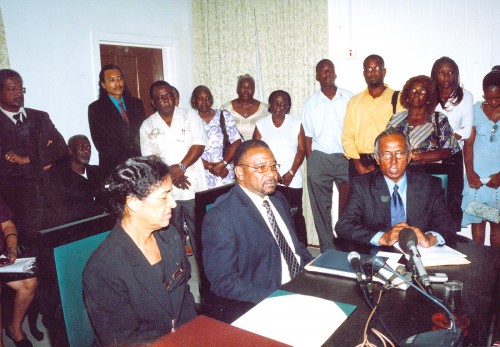
He added that the government should have created the fund in the same good faith it said it was acting as it pursued the other provisions of the Act which was not in force.
“Prime Minister, let us before the end of next week hear the details of the fund; tell us in which account it is, how much money there is and what are the procedures for accessing it and then we will believe you,” Murray declared.
His call seemed to find favour with the Prime Minister who nodded and signalled by gesturing that he would do so.
Resigned as PNCR Chairman
On January 17, 2009, Murray announced his resignation as PNCR Chairman, saying that the party’s public departure from a position he took on the Economic Partnership Agreement (EPA) had made it “impossible” to continue to hold the office with credibility.
Murray announced the decision to step down in a statement saying it was the direct result of a “principled objection” to a statement by the party that amounted to the “abandonment” of the position he had publicly represented during consultations hosted by President Bharrat Jagdeo on the proposed EPA between the European Union (EU) and Cariforum.
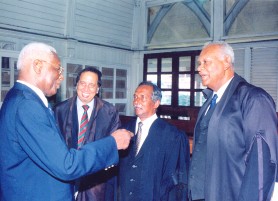
At the consultations held last September, Murray indicated support for the President’s position on the signing of the EPA, given the burdens that adjustment would place on the country. He said the party did not see the EPA as a fair agreement in reality, saying that it would impact severely on development. The PNCR, however, later sought to “clarify” its position on the EPA, saying that while the EPA was deficient, it possessed many positive aspects, including its potential for aiding Guyana’s trade and development. The party said too that while it saw merit in some of the President’s arguments, it had strong reservations about his timing.
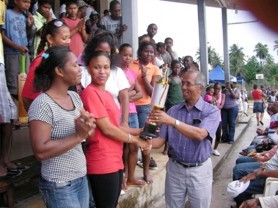
At the time, Murray was performing the functions of leader in the absence of substantive leader Robert Corbin. “I, therefore, represented the PNCR’s position both in that capacity and as the spokesperson on the subject matter, since I am also the shadow Minister for Finance and Economic Development, he explained in the statement. “It was my strongly held view, and still is, that, in such a circumstance, it has become impossible for me to continue with any credibility in the office of Chairman of the Party.”
Code
On April 2 this year Murray advocated a code to guide the conduct of ministers, as part of a concerted approach to rein in what he described as rampant corruption within government.
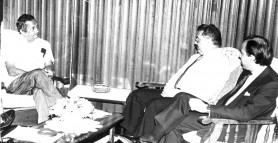
At a symposium on “Financial Accountability and Good Governance,” held at City Hall, Murray also urged international donors as well as civil society to make stronger demands for transparency and accountability, describing them as pillars of good governance.
Murray said the corruption prevails at all levels of society, and despite an abundance of evidence the authorities do nothing. He cited several prominent corruption cases. He contended that the most persistent fraud is the siphoning off of financial resources through the government’s capital expenditure budget. He said “a prominent government operative,” whom he declined to identify, estimated that approximately “20% of all capital expenditure” is illegally diverted from the projects for which it was intended, both robbing and burdening taxpayers. “You can judge for yourself where Guyana sits at this point in time in relation to those yardsticks to measure governance,” he noted.
Murray said in some countries there are written codes of conduct for public officials, including ministers, to ensure responsibility. He pointed to Australia, where ministerial guidelines demand that office holders accept responsibility after wrong doing or failures within their administrations. “You have to resign,” he explained, while urging, “Let us have a code that is made public, that could bring people to accountability when wrong is committed.”
According to Murray, the adoption of such procedures could ensure “the poor public servant is not made the scapegoat” for what occurs under his/her watch.
Murray also challenged international lenders and the donor community to make stronger demands for good governance. He noted that they have to balance the recognition of a country’s sovereignty with their right to know what is happening with the funds they have loaned for development. However, he explained that there are instances where donor territories, like Norway and Lichtenstein, have put out guidelines on good governance and anti-corruption, stating procedures expected to be implemented so that the public could voice concerns over possible mismanagement and corruption. “Is that too much to ask? Is that crossing the divide [of] this imaginary line that they not want to cross? I suggest no,” Murray said. Further, he noted that financial assistance comes from taxpayers in the donor countries and an interest in the propriety of expenditure could hardly be deemed out of place. “I make bold to say that I believe some of our financial institutions and friendly donor countries shy away from taking that on,” he added.
2010 budget
Murray, always his party’s point-man on the budget, criticised the government’s 2010 budget as big on spending but short on good policies, saying the measure of its worth is the impact it makes on the lives of ordinary citizens.
Murray, his voice soaring across the National Assembly, insistently asked about job creation and what number of jobs, if any, the administration hopes to create this year, since according to him, the budget makes no mention of it. He declared that prosperity is nowhere around the corner based on the projected growth rate this year.
In a speech punctuated with a string of questions about what people will get from the budget, Murray offered up a basic conclusion on what Guyanese can expect in 2010–continued struggles. “…In it, I daresay, they would see no respite from the burdens they bear, their personal and family futures would not sparkle with hope as a result of it,” he told the Assembly.
He said statements about “no new taxes” in the budget this year means nothing, because nothing has been done to lift “the oppressive burden of taxation on the citizenry.” He called on the government to return the VAT windfall to the people through a reduction, while noting that there is also need for a graduated progressive rate of income tax to be reintroduced.
Murray ripped into budget, saying that even if the projected rate of 4.4 % is achieved the average growth would only increase from 2.8% to 3%. This, he said, is unlikely to have any significant positive impact on the chronic and growing level of unemployment. He said too that an annual rate of 3% for a (low/middle income developing country) is hardly the basis on which prosperity can be built or expected in the foreseeable future.
Perhaps Murray’s most critical assessment came when he decided to speak on the sugar industry. He concluded that the industry is nowhere near the picture painted in the budget and outlined a number of problems facing the industry, including failed production targets; an inadequate cane supply; a factory still not operating at capacity and the projected two years before the industry returns to marginal profitability. He said that taxpayers are basically subsidising an industry that is being managed poorly by “political appointees. …One is bound to consider seriously whether it is not the case that the heavy capital investment in sugar is more consistent with political calculations than with economic ideas and logic. While the PNCR-1G wishes the industry well we cannot honestly say we are excited by its prospects.”
Murray served as a senior minister and deputy prime minister in the PNC administration between 1985 and 1992. He also served as head of the Presidential Secretariat, head of the Department of International Economic Cooperation, and permanent secretary in the Ministry of Trade. Murray also had a stint in diplomatic service at Guyana’s Embassy in Brussels. He had been an MP for the PNC since 1985 and served as chairman of the Public Accounts Committee until May 2006.
(More later)



